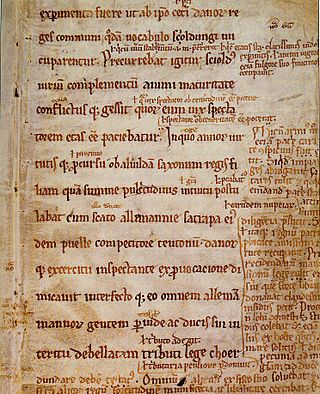Lists of abbreviations contain abbreviations and acronyms in different languages and fields. They include Latin and English abbreviations and acronyms.
Lists of abbreviations contain abbreviations and acronyms in different languages and fields. They include Latin and English abbreviations and acronyms.
Lists of abbreviations in the English language:
An acronym is a type of abbreviation formed from the initial components of the words of a longer name or phrase,
Abbreviations in other languages:
An abbreviation is a shortened form of a word or phrase, by any method. It may consist of a group of letters or words taken from the full version of the word or phrase; for example, the word abbreviation itself can be abbreviated as abbr., abbrv., or abbrev.. It may also consist of initials only, a mixture of initials and words, or words or letters representing words in another language. Some types of abbreviations are acronyms or grammatical contractions or crasis.
Military slang is an array of colloquial terminology used commonly by military personnel, including slang which is unique to or originates with the armed forces. In English-speaking countries, it often takes the form of abbreviations/acronyms or derivations of the NATO Phonetic Alphabet, or otherwise incorporates aspects of formal military terms and concepts. Military slang is often used to reinforce or reflect interservice rivalries.
A three-letter acronym (TLA), or three-letter abbreviation, is an abbreviation consisting of three letters. These are usually the initial letters of the words of the phrase abbreviated, and are written in capital letters ; three-letter abbreviations such as etc. and Mrs. are not three-letter acronyms, but "TLA" itself is a TLA.
The Old English Bible translations are the partial translations of the Bible prepared in medieval England into the Old English language. The translations are from Latin texts, not the original languages.

A gloss is a brief notation, especially a marginal or interlinear one, of the meaning of a word or wording in a text. It may be in the language of the text or in the reader's language if that is different.

An acronym, a type of abbreviation, is a word or name consisting of parts of the full name's words. Some authorities add that an acronym must be pronounced as a single word rather than individual letters, so considering NASA an acronym but not USA; the latter they instead call an initialism or alphabetism, for a string of initial letters which are pronounced individually. Acronyms commonly are formed from initials alone, such as NATO, FBI, YMCA, GIF, EMT, and PIN, but sometimes use syllables instead, as in Benelux, NAPOCOR, and TRANSCO. They can also be a mixture, as in radar and MIDAS.

Scribal abbreviations or sigla are abbreviations used by ancient and medieval scribes writing in various languages, including Latin, Greek, Old English and Old Norse.

Acronym Finder (AF) is a free, online, searchable dictionary and database of abbreviations and their meanings.

The Glosas Emilianenses are glosses written in the 10th or 11th century to a 9th-century Latin codex. These marginalia are important as early examples of writing in a form of Romance similar to Spanish, and in Basque. The anonymous author is assumed to have been a monk at the monastery now known as Suso, one of the twin monasteries of San Millán de la Cogolla . He wrote about a thousand years ago in three languages:
Linguistic categories include
Acronyms are very commonly used in healthcare settings. They are formed from the lead letters of words relating to medications, organisations, procedures and diagnoses. They come from both English and Latin roots. Acronyms have been described as jargon. and their use has been shown to impact the safety of patients in hospitals, owing to ambiguity and legibility.
Scientific terminology is the part of the language that is used by scientists in the context of their professional activities. While studying nature, scientists often encounter or create new material or immaterial objects and concepts and are compelled to name them. Many of those names are known only to professionals. However, due to popularization of science, they gradually become part of common languages. Several categories of scientific terminology can be distinguished.
Lists of acronyms contain acronyms, a type of abbreviation formed from the initial components of the words of a longer name or phrase. They are organized alphabetically and by field.